人教版小学英语语法讲解及习题:一般现在时
完整版)小学一般现在时讲解及练习题
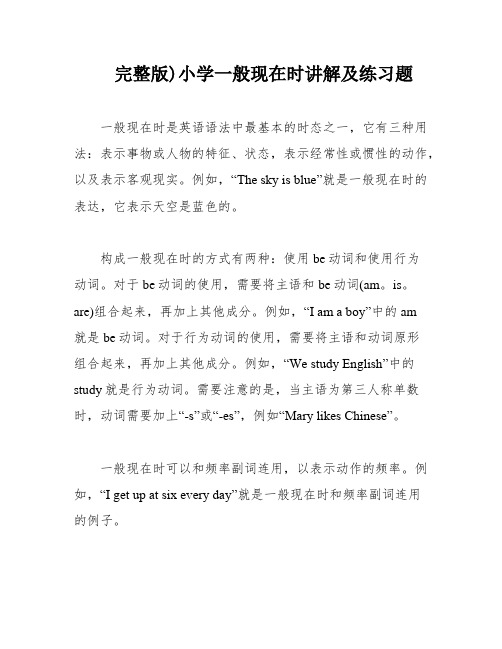
完整版)小学一般现在时讲解及练习题一般现在时是英语语法中最基本的时态之一,它有三种用法:表示事物或人物的特征、状态,表示经常性或惯性的动作,以及表示客观现实。
例如,“The sky is blue”就是一般现在时的表达,它表示天空是蓝色的。
构成一般现在时的方式有两种:使用be动词和使用行为动词。
对于be动词的使用,需要将主语和be动词(am。
is。
are)组合起来,再加上其他成分。
例如,“I am a boy”中的am就是be动词。
对于行为动词的使用,需要将主语和动词原形组合起来,再加上其他成分。
例如,“We study English”中的study就是行为动词。
需要注意的是,当主语为第三人称单数时,动词需要加上“-s”或“-es”,例如“Mary likes Chinese”。
一般现在时可以和频率副词连用,以表示动作的频率。
例如,“I get up at six every day”就是一般现在时和频率副词连用的例子。
一般现在时还可以用于构成否定句、一般疑问句和特殊疑问句。
对于be动词的否定句,需要在be动词后面加上not。
例如,“He is not a worker”就是be动词的否定句。
对于行为动词的否定句,需要在主语和动词原形之间加上don't或doesn't。
例如,“I don't like bread”和“He doesn't often play”就是行为动词的否定句。
对于一般疑问句,需要将be动词或do/does放在主语前面。
例如,“Are you a student?”就是一般疑问句。
对于特殊疑问句,需要在疑问词后面加上一般疑问句。
例如,“Where is my bike?”就是特殊疑问句。
需要注意的是,当主语为第三人称单数时,否定句和一般疑问句需要用doesn't,而不是don't或do。
例如,“He doesn't often play”和“Does she go to work by bike?”就是主语为第三人称单数时的否定句和一般疑问句。
人教版小学英语语法--时态总结(一般现在时-一般过去式-现在进行时-一般将来时)
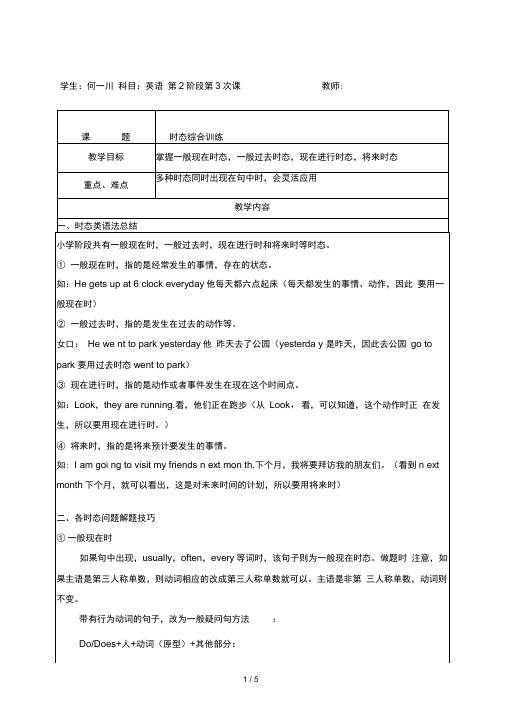
学生:何一川科目:英语第2阶段第3次课教师:学生:何一川科目:英语第2阶段第3次课教师:带有Be动词的句子,改为一般疑问句的方法:Be+人+其他:He is a good student.-----s he a good student?(第三人称单数用does开头,非第三人称单数用do开头,一二人称互换,l--You,We-You)例题:I usually go to school by bike. --------- Do you usually go to school by bike? (该句人称要互换)He ofte n watches TV on Sundays- ------ D oes he ofte n watch TV on Sun days?They often play football after dinner. ----------- Do they often play football after dinn er?②一般过去时女口果句中出现,last week/last weekend/last month/last year yesterday the day before yesterday X days ago (其中,last是“上一” d的意思,ago是“…前”的意思)等词时,该句子则为一般过去时态。
做题时,只要把动词,改成过去时态。
关键是记忆总结不规贝U动词的过去式。
如:go---went,do---did,swim--swam例题:I visited my grandmother last weekend.They bought a new bike10 days ago.He was ill yesterday.改为一般疑冋句:Did +人+动词(原型)+其他?③现在进行时如果句中出现,look,listen,now等词(看,XX正在做某事;听,XX正在做某事;现在,XX正在做某事)。
小学英语一般现在时讲解附练习

小学英语一般现在时讲解及专项练习(附答案)时态是英语中一个重要的语法范畴,小学英语主要是如下的四大时态:一般现在时、现在进行时、一般过去时、一般将来时。
今天主要是小学英语时态重点讲解——一般现在时,附专项练习和答案!一般现在时主要描述经常会发生的动作、状态或不变的真理。
句末常出现every day/week/year/Monday , in the morning;句中常有always, usually, often, sometimesI am a student.He is tall.否定句:在be 后加notI am not a student.He is not tall.疑问句:be 动词提前到第一位。
Are you a student?Yes,I am./No,I am not.Is he tall?Yes,he is./No,he isn’t.We go to school on Monday.He goes to the park on Sunday.否定句:主语+don’t/doesn’t’t+动词原形+地点+时间We don’t go to school on Monday.He doesn’t go to the park on Sunday.疑问句:在句首加do或doesDo you go to school on Monday?Yes, we do./ No, we don’t.Does he go to the park on Sunday?Yes, he does./ No, he doesn’t.专项练习一、写出下列动词的第三人称单数形式。
eat read do take washwatch have carry study flycatch go have cook looksing teach like get come play二、用单词的正确形式填空:1.Mike ___________ (do) his homework every day.2.There ____________ (be) some water in the glass.3.We like ____________ (play) basketball after class.4.I like singing. I often ____________ (listen) to the music in the evening.5.My grandma ___________ (watch) TV every day.三、选择最佳的答案:1.____Alice often play the piano. No, she _____.A. Do; doB. Does; doesC. Does; doesn't2.___ your penfriend __ in Beijing?A. Do; liveB. Do; livesC. Does; live3.Tom and Mike __ very excited, they will take a trip.A.IsB. areC. am4.I like ________ very much.What about you?A. danceB. dancedC. dancing5.I can’t find my pen. Let me __.A. go and ask herB. go and ask hersC. go and ask she6.Fangfang is a good student. She ____maths.A. does good atB. well do itC. is good at7.The kite ____ a bird.A. look likeB. is lookingC. looks like8.Bill and I ___ good friends.A. isB. areC. am9.Sandy often ___ his homework on Sundays .A. doB. doesC. did10.What do you usually do on the weekend? I __________.A.went swimmingB. go swimmingC. visited grandparents10.What do you usually do on your holiday?A. saw elephantsB. sing and danceC.took picture11.I ____ a student. I go to school ____bus every day.A. is; byB. am; onC. am; by12.I ____ a brother. She ____ a sister.A. have; hasB. has; hasC. have; have13.You ____ a student. He ____ a teacher.A. is; isB. are; isC. are; are15. He always _____ football games.A. watchesB. watchC. doesn't16.My best friend _____ shells.A. collectsB. collectC. often17.She doesn’t _____ listening to the music.A. oftenB. likeC. likes18.My mother and I ___ always watch romantic films.A. doesn’tB. don’tC. do19.---When _____ he get home on Friday?----He gets home at four on Friday.A. doB. doesC. did专项练习题答案一、写出下列动词的第三人称单数形式。
(完整版)一般现在时和特殊疑问句讲解及练习
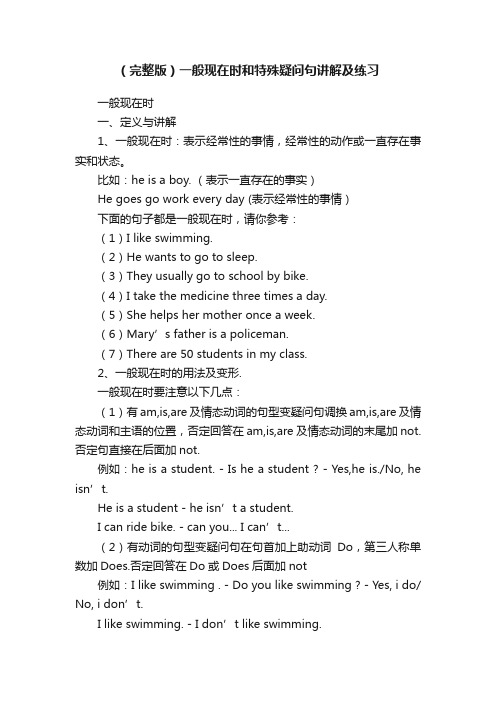
(完整版)一般现在时和特殊疑问句讲解及练习一般现在时一、定义与讲解1、一般现在时:表示经常性的事情,经常性的动作或一直存在事实和状态。
比如:he is a boy. (表示一直存在的事实)He goes go work every day (表示经常性的事情)下面的句子都是一般现在时,请你参考:(1)I like swimming.(2)He wants to go to sleep.(3)They usually go to school by bike.(4)I take the medicine three times a day.(5)She helps her mother once a week.(6)Mary’s father is a policeman.(7)There are 50 students in my class.2、一般现在时的用法及变形.一般现在时要注意以下几点:(1)有am,is,are及情态动词的句型变疑问句调换am,is,are及情态动词和主语的位置,否定回答在am,is,are及情态动词的末尾加not.否定句直接在后面加not.例如:he is a student. - Is he a student ? - Yes,he is./No, he isn’t.He is a student - he isn’t a student.I can ride bike. - can you... I can’t...(2)有动词的句型变疑问句在句首加上助动词Do,第三人称单数加Does.否定回答在Do或Does后面加not例如:I like swimming . - Do you like swimming ? - Yes, i do/ No, i don’t.I like swimming. - I don’t like swimming.(3)第三人称单数在动词的末尾要加s或es,以s,ch,sh结尾的单词加es,特殊单词特殊记.例如:He goes to school at 7:00 every day.要特别注意在什么情况要使用一般现在时.现在请你完成一些练习,让你更熟练地掌握一般现在时:(一).用动词的适当形式填空1. She _________(go) to school at seven o’clock.3. He usually ___________ up at 17:00.(get )4. She ___________ (live) in Beijing.7. My father __________ (watch) TV every evening .9.________ Amy _________ (read) English every day10. Chen Jie sometimes _________(go)to the park with her sister.(二).选择填空1.I want____homework now.A. doingB. to doC. to do myD. do my2.It's time______.A. go to schoolB. play gamesC. to go homeD. to do my homeworks3.______go and help her.A. Let's meB. Let's usC. Let'sD. Let's to4.Do they have a new car? Yes,_____.A .they are B.they have C. they don't D. they do5.He often _________ supper at 6:00 in the evening.A. haveB. has c. is having D. is eating6. We _____________ any Chinese classes on Friday.A. are havingB. aren’t havingC. don’t haveD. are have(三)、用括号内动词的适当形式填空。
一般现在时知识讲解与专项练习(讲义)-人教PEP版英语六年级上册

六年级上册一般现在时知识讲解与专项练习一、一般现在时知识点【No. 1】概念:1.表不事物或人物的特征、状态。
如:The sky is blue.天空是蓝色的。
2.表示经常性或习惯性的动作。
如:I get up at six every day.我每天六点起床。
3.表示客观现实。
如:The earth goes around the sun.地球绕着太阳转。
【No.2】时间标志性词:every ... (every day/week/Sunday...)on+星期几(on Mondays/Tuesdays..)频度副词(always, usually often sometimes, rarely, seldom, never)【No.3】结构:①动词原形I like apples.②动词单三形式He plays football.③be动词I am a boy.有be无动(动:实义动词)①肯定句:主语+be+其他He is an English teacher.②否定句:主语+be not+其他He is not an English teacher.③一般疑问句:Be +主语+其他+...?Is he an English teacher?有动无be(动:实义动词)①肯定句:主语(非三单)+动词原形+其他I play football.主语(三单)+动词三单形式+其他He plays football.②否定句:主语(非三单)+don’t+动词原形+其他I don't play football.主语(三单)+doesn’t动词原形+其他He doesn't play football.③一般疑问句:Do+主语(非三单)+动词原形+其他?Do you play football?Does+主语(三单)+动词原形+其他?①肯定形式:主语十情态动词can/may+动词原形+宾语。
小学英语语法时态讲解与归纳一般现在时
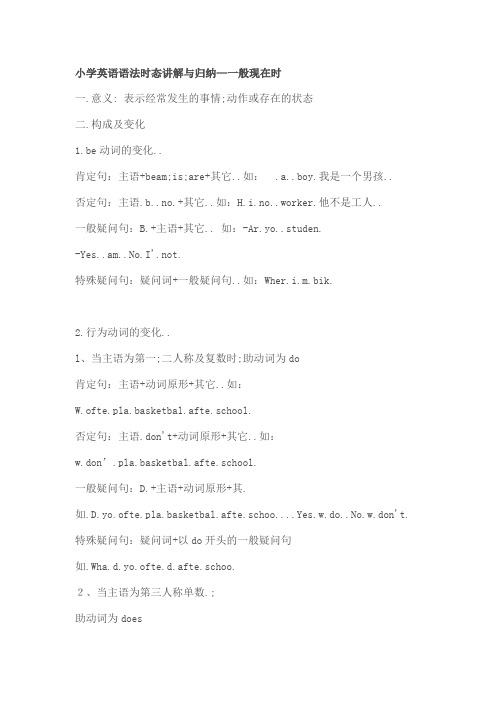
小学英语语法时态讲解与归纳—一般现在时一.意义: 表示经常发生的事情;动作或存在的状态二.构成及变化1.be动词的变化..肯定句:主语+beam;is;are+其它..如:.a..boy.我是一个男孩..否定句:主语.b..no.+其它..如:H.i.no..worker.他不是工人..一般疑问句:B.+主语+其它.. 如:-Ar.yo..studen.-Yes..am..No.I'.not.特殊疑问句:疑问词+一般疑问句..如:Wher.i.m.bik.2.行为动词的变化..l、当主语为第一;二人称及复数时;助动词为do肯定句:主语+动词原形+其它..如:W.ofte.pla.basketbal.afte.school.否定句:主语.don't+动词原形+其它..如:w.don’.pla.basketbal.afte.school.一般疑问句:D.+主语+动词原形+其.如.D.yo.ofte.pla.basketbal.afte.schoo....Yes.w.do..No.w.don't. 特殊疑问句:疑问词+以do开头的一般疑问句如.Wha.d.yo.ofte.d.afte.schoo.2、当主语为第三人称单数.;助动词为does肯定句:主语+动词三单式+其它..如.H.swim.well.否定句:主语.doesn’t+动词原形+其它..如:H.doesn’.swi.well..一般疑问句:Doe.+主语+动词原形+其它..如:Doe.h.swi.wel.Yes.h.does..No.h.doesn't.特殊疑问句:疑问词+以does开头的一般疑问句如.Ho.doe.you.fathe.g.t.wor.三.第三人称单数的动词变化规则只有在第三人称为主语的肯定句中;动词才用三单式1多数动词直接加s:runs gets likes collets takes playsclimbs…….2结尾是s.x.sh.ch.o;前为辅音字母;结尾加e.: watches teaches goes does washes crosses mixes brushes3动词末尾y前为辅音:将y改为i加es.study→studie.fly→flies carry→carriescry→cries但在y前如果为元音则直接加s: buys says四.时间标志:uall..ofte..sometime.;every…一般现在时练习题1I.用下列单词的适当形式填空1.We often___________play in the playground.2.He _________get up at six o’clock.3.__________you _________brush your teeth every morning4.What________________do he usually________________do after school5.Danny ________________study English; Chinese; maths; science and Art at school.6.Mike sometimes __________go to the park with his sister.7.At eight at night; she __________watch TV with his parents.8.________ Mike________read English every day9.How many lessons_________your classmates________have on Monday10.What time_________his mother_________do the houseworkII.改句子1.Do you often play football after school 改为肯定句2.I have many books.改为否定句3.Gao S han’s sister likes playing table tennis 改为否定句4.She lives in a small town near New York.改为一般疑问句5.I watch TV every day.改为一般疑问句6.We have four lessons.改为否定句7.Nancy doesn’t run fast 改为肯定句8.M.do.run.fast.................................否定句: 一般疑问句:9.Mike has two letters for him.一般疑问句:否定句: 10.I usually play football on Friday afternoon.否定句:一般疑问句:划线提问11.Su Yang usually washes some clothes on Saturday.否定句:一般疑问句:划线提问:12.Mingming usually waters the flowers every day.否定句:一般疑问句:13.Tom does his homework at home.否定句:一般疑问句:一般现在时练习题2一、用所给动词的真确形式填空1.. lik.___________.swim.2.H._________rea.Englis. ever. day.3.W._________got.schoo.a.seve.i.th.morning.4.Mike________got.schoo.a.seve.i.th.morning.5.M. mother________lik.______g.shopping.6..ca.________dra. man. beautifu. pictures.7.She_________mak.. mode. plane.8.D. yo.________like_________ru.9.Doe. he_________like_________jum.10.Doe.Nancy_________growflower.o.Saturda.11.Th. teachers________like___________dance.12.Th.teacher________like____________dance.13.Th.students___________spea.Englis.i.class.14.Th.student_________spea.Chines.afte.class.15.Let’s____________an.pla.footbal.. g.16.He____________.lik.swimmin.. no.17.I’.sorr.____________tha.. hea.18.Wan.Bin.is___________. writ. a.E-mai.t.hi.frien..19.H.has_____________.headach.. ge.20._________yo.stud.Englis.a.schoo..Ye..I___________. d.21.__________you.siste.stud.Englis.a.schoo..N..she_________.. d.22.I’.________.bette.. fee.23.Why__________To.absen.toda.. b.二、用所给的人称改写句子1..tak.photo.o.Sunday. Mike2.W.gro.beautifu.flowers.she3.The.lik.collectin.stamps.Ben4..liste.t.musi.carefully.m.aunt5.Yo.lik.makin..mode.ship.Helen6.W.clea.th.classroo.ever.day.he7.The.loo.afte.th.pandas.M.Wang8..dra..tre.an.som.flowers.Nancy9.W.g.t.be.a.eight. m.sister10..rea.newspaper.i.th.evening.M.Green。
小学生一般现在时讲解及练习题
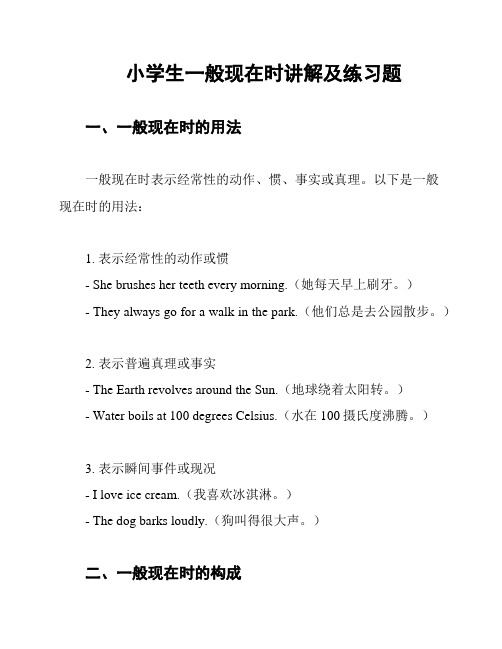
小学生一般现在时讲解及练习题一、一般现在时的用法一般现在时表示经常性的动作、惯、事实或真理。
以下是一般现在时的用法:1. 表示经常性的动作或惯- She brushes her teeth every morning.(她每天早上刷牙。
)- They always go for a walk in the park.(他们总是去公园散步。
)2. 表示普遍真理或事实- The Earth revolves around the Sun.(地球绕着太阳转。
)- Water boils at 100 degrees Celsius.(水在100摄氏度沸腾。
)3. 表示瞬间事件或现况- I love ice cream.(我喜欢冰淇淋。
)- The dog barks loudly.(狗叫得很大声。
)二、一般现在时的构成在一般现在时中,动词的变化相对简单。
1. 对于第三人称单数(He/She/It),动词要加-s或-es。
- He walks to school every day.(他每天走路去学校。
)- She eats an apple.(她吃一个苹果。
)- It runs fast.(它跑得很快。
)2. 对于其他人称(I/You/We/They),动词不变。
- I play soccer on weekends.(我周末踢足球。
)- You read books every night.(你每晚读书。
)- We go swimming in summer.(我们夏天去游泳。
)- They watch movies together.(他们一起看电影。
)三、练题请根据句意填入正确的动词形式。
1. My mother __________ (cook) dinner for us every evening.2. Tom and Lisa __________ (play) tennis on Saturdays.3. The sun __________ (rise) in the east.4. We __________ (study) English at school.5. Dogs __________ (bark) when they see strangers.1. cooks2. play3. rises4. study5. bark希望以上讲解和练习题对你有帮助!。
(完整版)一般现在时讲解+练习
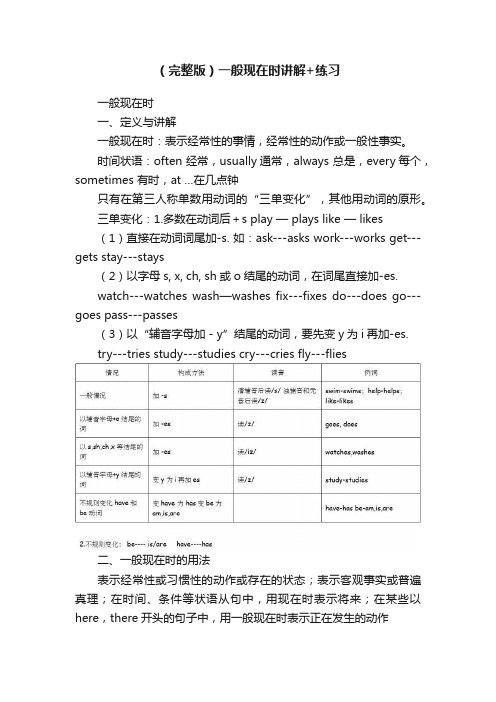
(完整版)一般现在时讲解+练习一般现在时一、定义与讲解一般现在时:表示经常性的事情,经常性的动作或一般性事实。
时间状语:often 经常,usually通常,always 总是,every每个,sometimes 有时,at …在几点钟只有在第三人称单数用动词的“三单变化”,其他用动词的原形。
三单变化:1.多数在动词后+s play — plays like — likes(1)直接在动词词尾加-s. 如:ask---asks work---works get---gets stay---stays(2)以字母s, x, ch, sh或o结尾的动词,在词尾直接加-es.watch---watches wash—washes fix---fixes do---does go---goes pass---passes(3)以“辅音字母加 - y”结尾的动词,要先变y为i再加-es.try---tries study---studies cry---cries fly---flies二、一般现在时的用法表示经常性或习惯性的动作或存在的状态;表示客观事实或普遍真理;在时间、条件等状语从句中,用现在时表示将来;在某些以here,there开头的句子中,用一般现在时表示正在发生的动作当主语是第三人称单数时:1、动词变相应的第三人称单数形式2、肯定句主语+动词s+其它3、否定句主语+doesn't+动词原形+其它4、一般疑问句Does+主语+动词原形+其它5、肯定回答 Yes,主语+does6、否定回答 No,主语+doesn't7、特殊疑问句特殊疑问词+一般疑问句当主语不是第三人称单数时:1、肯定句主语+动词原形+其它2、否定句主语+don't+动词原形+其它3、一般疑问句 Do+主语+动词原形+其它4、要注意,句式结构错则全都错。
5、谓语动词的形式:do/does一般现在时练习一、用所给词的正确形式填空1. We often ___________ (play) on the playground.2. He _________ (get) up at six o’clock.3. __________you _________ (brush) your teeth every morning.4. What____ (do) he usually _____ (do) after school?5. Danny _______ (study) English, Chinese, Math, Science and Art at school.6. Mike sometimes __________ (go) to the park with his sister.7. At eight at night, she ________ (watch) TV with his parents.8. ________ Mike________ (read) English every day?9. How many lessons ______your classmate____ (have) on Monday?10. What time ____his mother_________ (do) the housework?11. He often ______ (have) dinner at home. 12. Daniel and Tommy___ (be) in Class One. 13. We____ (not watch) TV on Monday. 14. Nick _____(not go) to the zoo on Sunday.15. They______ (like) the World Cup? 16. What ____they often ____ (do) on Saturdays17. Your parents________ (read) newspapers every day?18. The girl______ (teach) us English on Sundays.19. She and I _______ (take) a walk together every evening.20. There_______ (be) some water in the bottle. 21. Mike ______ (like) cooking.22. They_______ (have) the same hobby. 23. My aunt______ (look) after her baby carefully.24. You always____ (do) your homework well. 25. I_____ (be) ill. I’m sta ying in bed.26. She_____ (go) to school from Monday to Friday. 27. Liu Tao _____ (do) not like PE.28. The child often______ (watch) TV in the evening.29. Su Hai and Su Yang ______(have) eight lessons this term.30. -What day ______(be) it today? -It’s Saturday.31. Don’t make a noise. Grandpa __________ (sleep).32. Tom’s family__________ (watch) TV.33. It ________ (take) me two hours to finish my homework last night.34. What ______ your mother _______ (do) every evening? She_______ (wash) clothes.35. _______ it ______ (rain) every day?36. What _______ (do) you _______ on Sundays? We ________ (play) football.37. There ________ (be) a football match on TV every morning.38. They often ________ (visit) the Great Wall.39. Who _______ (dance) the best in your class?40. He _____________ (not come).41. The earth __________ (move) round the sun.42 She ________ (buy) a sweater.43. Mr. Wang often______ (go) to Shanghai.二、改句子1. Do you often play football after school? (肯定回答)_______________________________2. I have many books. (改为否定句)_______________________________3. Gao Shan's sister likes playing table tennis (改为否定句)________________________4. She lives in a small town near New York. (改为一般疑问句)________________________5. I watch TV every day. (改为一般疑问句)________________________6. David has a goal. (改为一般疑问句)________________________7. We have four lessons.(否定句)________________________8. Nancy doesn’t run fast (肯定句)________________________9. My dog runs fast. (一般疑问句) ________________________(把10—14小题变否定句,一般疑问句和划线提问)10. Mike has two letters for him. ________________________11. I usually play football on Friday afternoon.________________________12. Su Yang usually washes some clothes on Saturday. ________________________13. Mingming usually waters the flowers every day. ________________________14. Tom does his homework at home. ________________________三、写出下列动词的第三人称单数形式:1. wash_________ match _______ guess______ study______finish_________ go________ snow______ carry_________2. stop______ see________ drive ________let_______ carry______keep_____ join______ find_______ think________ teach______ catch______3. stay_______ begin______ forget_______ lie________ die _______run_______ prefer______ give________ ring_______ dance______ hope_______四、单项选择:1. There _____ an English film at the cinema now.A. will haveB. is going to haveC. is going to beD. is2. The picture _______ nice. A. looks B. is looked C. look D. is looking3. She ______ down and soon falls asleep. A. live B. lain C. laidD. sits4. They _____ the office in time very morning. A. reach to B. arrived C. went D. get to5. We shall go to Shanghai on business before you _____ back next week.A. will comeB. cameC. would comeD. come6. The plane ______ over there. A. is B. are C.am D. was7. I see her ____ the room this morning. A. to enter B. enteredC. enterD. enters8. The teacher ________us to come to school on time. A. ask B. asking C. asks D. asked9. John always ______ others. A. help B. helping C. helps D. to help10. He ______for eight hours every day. A. working B. to workC. worksD. worked11. You’d better ______ at home and ______ your homework.A. to stay, doB. stay, doC. to stay, to doD. stay, to do12. He sits down and ______ a rest. A. having B. have C. to haveD. has13. Uncle Wang never ______ a cake. A. make B. to make C. making D. makes五、请写出下列句子1.他每天早上七点乘公交车去上学。
小学英语一般现在时的讲解和练习

小学英语一般现在时的讲解和练习一、一般现在时的构成一般现在时的构成非常简单,一般情况下,我们只需要在动词原形后面加上-s或-es 即可。
例如:I play basketball.(我打篮球。
)He studies English.(他学习英语。
)She watches TV.(她看电视。
)但是,还有一些特殊情况需要注意:如果动词以辅音字母+y结尾,将y变成i,再加上-es。
例如:study → studies, fly → flies。
如果动词以s、x、ch、sh或o结尾,加上-es。
例如:watch → watches, fix → fixes, teach → teaches。
如果动词以辅音字母+o结尾,加上-es。
例如:go → goes, do → does。
如果动词以元音字母+o结尾,加上-s。
例如:play → plays, enjoy → enjoys。
二、一般现在时的用法表示经常性的动作或习惯。
例如:I usually get up at 7 o'clock in the morning.(我通常早上7点起床。
)表示客观事实或普遍真理。
例如:The sun rises in the east.(太阳从东方升起。
)表示现在的状态或情况。
例如:He is a student.(他是一名学生。
)表示频繁或不断发生的动作或状态。
例如:She always sings when she is happy.(她开心的时候总是唱歌。
)表示说话人的观点或看法。
例如:I think English is an interesting language.(我认为英语是一门有趣的语言。
)三、一般现在时的练习选择正确的动词形式填空。
Tom _______ (like/likes) to play basketball after school.My mother _______ (cook/cooks) delicious food every day.The weather _______ (be/is) fine today.My sister _______ (read/reads) books every night before she goes to bed.The cat _______ (drink/drinks) milk every morning.答案:1) likes 2) cooks 3) is 4) reads 5) drinks用所给单词的适当形式填空。
小学英语语法时态讲解与归纳一般现在时

千里之行,始于足下。
小学英语语法时态讲解与归纳一般现在时一般现在时(Simple Present Tense)是表示经常性、习惯性或普遍性的动作或状态的时态。
它用于描述我们现在经常或总是发生的动作、习惯、经验、事实和固定的真理。
下面是小学英语语法时态讲解与归纳一般现在时的内容:1. 构成一般现在时的肯定句结构为:主语 + 动词原形(第三人称单数加-s)+ 其他。
例如:- I play soccer every Saturday.(我每个星期六踢足球。
)- She eats an apple every morning.(她每天早上吃一个苹果。
)2. 第三人称单数的变化在一般现在时中,第三人称单数的动词要加上-s、-es或-ies。
例如:- She plays soccer every Saturday.(她每个星期六踢足球。
)- He eats an apple every morning.(他每天早上吃一个苹果。
)- My brother watches TV every night.(我的哥哥每天晚上看电视。
)3. 否定句和疑问句第1页/共3页锲而不舍,金石可镂。
- 否定句:在动词前加do not(don't)或does not(doesn't)。
例如:- I don't play soccer every Saturday.(我不是每个星期六踢足球。
)- She doesn't eat an apple every morning.(她不是每天早上吃一个苹果。
)- 疑问句:将助动词do(does)提到主语前。
例如:- Do you play soccer every Saturday?(你每个星期六踢足球吗?)- Does she eat an apple every morning?(她每天早上吃一个苹果吗?)4. 频率副词频率副词用来修饰动词,表示动作发生的频率。
小学英语语法一般现在时(包括练习)
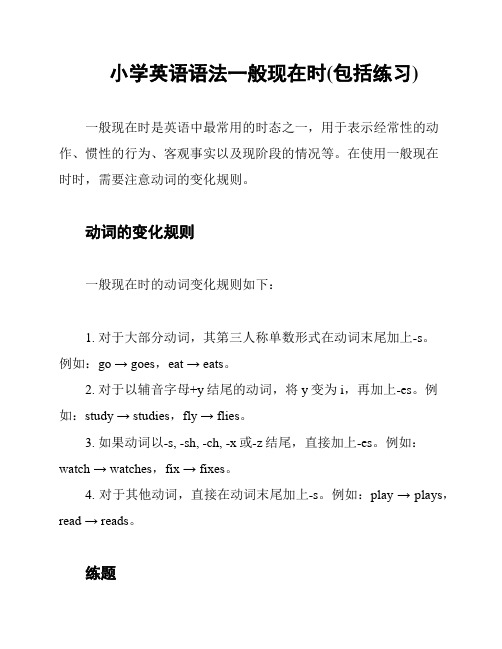
小学英语语法一般现在时(包括练习)一般现在时是英语中最常用的时态之一,用于表示经常性的动作、惯性的行为、客观事实以及现阶段的情况等。
在使用一般现在时时,需要注意动词的变化规则。
动词的变化规则一般现在时的动词变化规则如下:1. 对于大部分动词,其第三人称单数形式在动词末尾加上-s。
例如:go → goes,eat → eats。
2. 对于以辅音字母+y结尾的动词,将y变为i,再加上-es。
例如:study → studies,fly → flies。
3. 如果动词以-s, -sh, -ch, -x或-z结尾,直接加上-es。
例如:watch → watches,fix → fixes。
4. 对于其他动词,直接在动词末尾加上-s。
例如:play → plays,read → reads。
练题请根据句子的语境,用适当的动词形式填空。
每个空格只填一个单词。
1. Peter ___________ (like) to play basketball with his friends every weekend.2. My mother ___________ (work) as a nurse in the hospital.3. The cat ___________ (sleep) on the sofa most of the day.4. We ___________ (watch) movies at the cinema every Friday night.5. Sarah ___________ (brush) her teeth twice a day.参考答案1. Peter likes to play basketball with his friends every weekend.2. My mother works as a nurse in the hospital.3. The cat sleeps on the sofa most of the day.4. We watch movies at the cinema every Friday night.5. Sarah brushes her teeth twice a day.以上是关于小学英语语法一般现在时以及练习题的内容。
一般现在时的概念及例句(讲义)-人教PEP版英语六年级上册
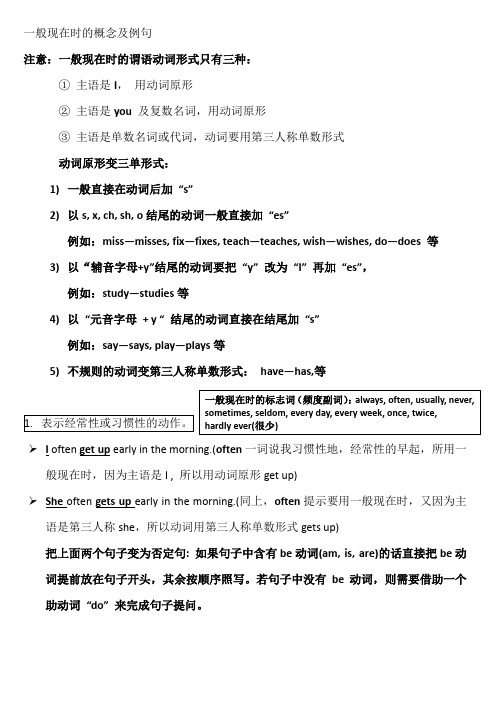
一般现在时的概念及例句注意:一般现在时的谓语动词形式只有三种:① 主语是I , 用动词原形② 主语是you 及复数名词,用动词原形③ 主语是单数名词或代词,动词要用第三人称单数形式动词原形变三单形式:1) 一般直接在动词后加 “s”2) 以s, x, ch, sh, o 结尾的动词一般直接加 “es”例如:miss—misses, fix—fixes, teach—teaches, wish—wishes, do—does 等3) 以“辅音字母+y”结尾的动词要把 “y” 改为 “I” 再加 “es”,例如:study—studies 等4) 以 “元音字母 + y “ 结尾的动词直接在结尾加 “s”例如:say—says, play—plays 等5) 不规则的动词变第三人称单数形式: have—has,等➢ I often get up early in the morning.(often 一词说我习惯性地,经常性的早起,所用一般现在时,因为主语是I , 所以用动词原形get up)➢ She often gets up early in the morning.(同上,often 提示要用一般现在时,又因为主语是第三人称she ,所以动词用第三人称单数形式gets up)把上面两个句子变为否定句: 如果句子中含有be 动词(am, is, are)的话直接把be 动词提前放在句子开头,其余按顺序照写。
若句子中没有be 动词,则需要借助一个助动词 “do” 来完成句子提问。
I often get up early in the morning.→Do you often get up early in the morning?(这里需要注意,如果主语是“I” 的肯定句变成疑问句主语要变成“you” )She often gets up early in the morning.→Does she often get up early in the morning.(这里需要注意的是,如果主语是第三人称名词或代词的话,助动词do要变成动词的第三人称单数形式does,否定形式为does not=doesn’t. 此时真正实义动词(get up)保留原形)2.表示长期存在的特征或状态。
英语一般现在时全面讲解(附练习及答案)
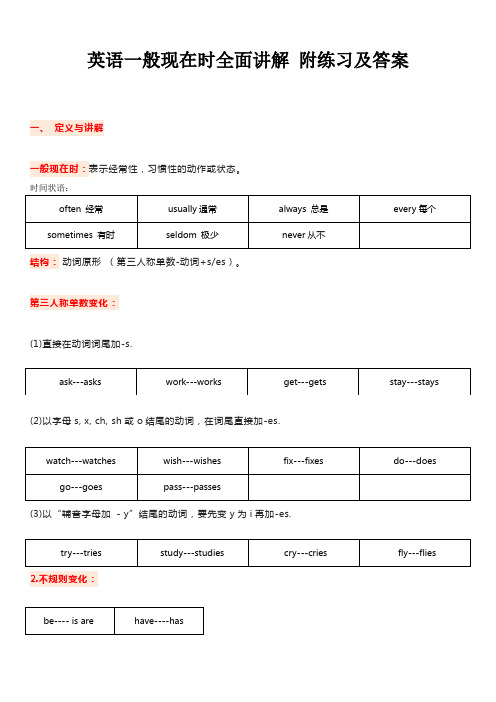
英语一般现在时全面讲解附练习及答案一、定义与讲解一般现在时:表示经常性,习惯性的动作或状态。
结构:动词原形(第三人称单数-动词+s/es)。
第三人称单数变化:(1)直接在动词词尾加-s.(2)以字母s, x, ch, sh或o结尾的动词,在词尾直接加-es.(3)以“辅音字母加- y”结尾的动词,要先变y为i再加-es.2.不规则变化:二、一般现在时用法1. 表示经常性,习惯性,永久性的动作或存在的状态.通常与副词sometimes, often, usually, always, every day (year, month ), once (twice, three times) a day,等时间状语连用。
2. 表示客观真理,科学原理,自然现象,等客观事实或格言,谚语等。
三、一般现在时的句子转换:(1)当句子中有be动词或情态动词时,则把be动词或情态动词(can,could等等)提到主语的前面变成疑问句;在be动词或情态动词后面加not变成否定句.(2)当句子中即没有be动词,也没有情态动词时,则在主语前加助动词do (you,以及复数), does(单数she,he,it)变成问句;在主语后谓语动词前加助动词don’t(I,you,以及复数), doesn’t(单数she,he,it)变成否定句,助动词后的动词要变成动词原形。
名师解析1.________ you often ________ tea?A.Do;drinks B.Does;drink C.Do;drink分析:你经常喝茶吗?根据often可知句子为一般现在时,主语为you,用助动词Do提问,动词用原形,C 符合题意,故选C。
2.My legs .A.hurt B.hurts C.hurting分析:我的腿……。
A痛,动词原形;B痛,动词单三形式,主语是名词复数,谓语动词用原形,排除;C痛,现在分词,用于现在进行时,构成be doing,缺少be,排除。
小学英语一般现在时知识点全面讲解附练习及答案
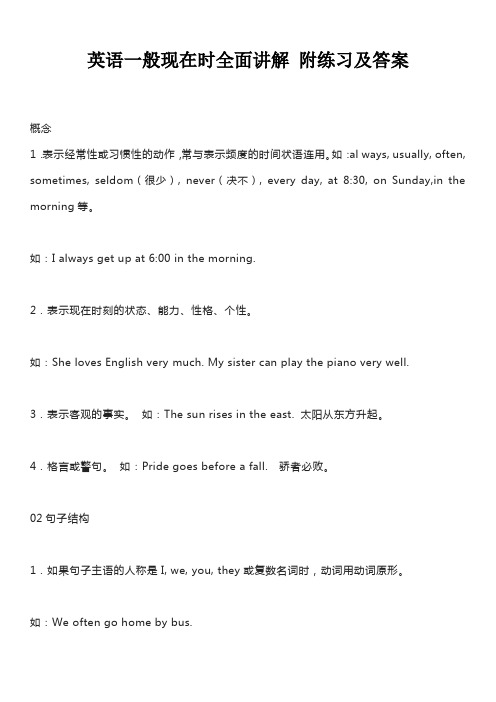
英语一般现在时全面讲解附练习及答案概念1.表示经常性或习惯性的动作,常与表示频度的时间状语连用。
如:al ways, usually, often, sometimes, seldom(很少), never(决不), every day, at 8:30, on Sunday,in the morning等。
如:I always get up at 6:00 in the morning.2.表示现在时刻的状态、能力、性格、个性。
如:She loves English very much. My sister can play the piano very well.3.表示客观的事实。
如:The sun rises in the east. 太阳从东方升起。
4.格言或警句。
如:Pride goes before a fall. 骄者必败。
02句子结构1.如果句子主语的人称是I, we, you, they或复数名词时,动词用动词原形。
如:We often go home by bus.2.如果句子的主语是第三人称单数,即:he, she, it 或单数名词时,动词要用第三人称的单数形式。
如:He often goes home by bus03动词的第三人称单数构成规则1.一般情况下在动词的后面直接加“s”;如:work→works play→plays¬ rain→rains see→sees visit→visits2.以o, x,s,sh, ch结尾的动词,在后面加“es”;如:do→does fix→fixes guess→guesses wash→washes teach→teaches3.以辅音字母加y结尾的动词,先把“y”改为“i”, 再加“es”;如:fly→flies study→studies carry→carries4.不规则变化。
如:have→has04注意在一般现在时的句子中,如果前面使用了助动词does, doesn’t, will, won’t, can, can’t, would, wouldn’t, must, mustn’t 等,尽管主语是第三人称单数,后面的动词用动词原形。
小学英语语法及习题--四大基本时态
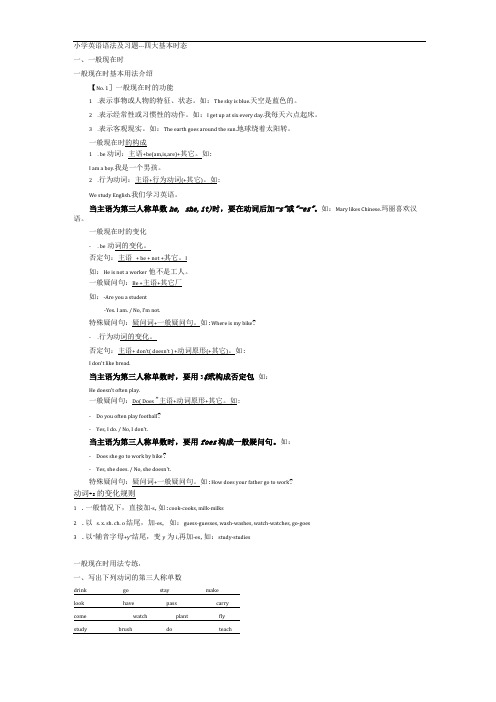
小学英语语法及习题---四大基本时态一、一般现在时一般现在时基本用法介绍【No. 1]一般现在时的功能1.表示事物或人物的特征、状态。
如:The sky is blue.天空是蓝色的。
2.表示经常性或习惯性的动作。
如:I get up at six every day.我每天六点起床。
3.表示客观现实。
如:The earth goes around the sun.地球绕着太阳转。
一般现在时的构成1. be 动词:主语+be(am,is,are)+其它。
如:I am a boy.我是一个男孩。
2.行为动词:主语+行为动词(+其它)。
如:We study English.我们学习英语。
当主语为第三人称单数he, she,it)时,要在动词后加-s"或"-es"。
如:Mary likes Chinese.玛丽喜欢汉语。
一般现在时的变化-. be动词的变化。
否定句:主语+ be + not +其它。
I如:He is not a worker他不是工人。
一般疑问句:Be +主语+其它厂如:-Are you a student-Yes. I am. / No, I'm not.特殊疑问句:疑问词+一般疑问句。
如:Where is my bike?-.行为动词的变化。
否定句:主语+ don't( doesn't ) +动词原形(+其它)。
如:I don't like bread.当主语为第三人称单数时,要用3$玳构成否定包如:He doesn't often play.一般疑问句:Do( Does "主语+动词原形+其它。
如:-Do you often play football-Yes, I do. / No, I don't.当主语为第三人称单数时,要用foes构成一般疑问句。
如:-Does she go to work by bike-Yes, she does. / No, she doesn't.特殊疑问句:疑问词+一般疑问句。
小学英语语法-一般现在时详细讲解

千里之行,始于足下。
小学英语语法-一般现在时详细讲解一般现在时(Simple Present Tense)是英语中最常用的时态之一,表示经常性的行为、习惯、真理、现在的状态等。
以下是关于一般现在时的详细讲解:1. 用法:- 表示客观真理或事实:The sun rises in the east. (太阳从东方升起。
)- 表示经常性的行为或习惯:He reads books every night. (他每晚都看书。
)- 表示现阶段的状态或现象:She speaks three languages. (她会说三种语言。
)2. 构成:- 肯定句:主语 + 动词原形(第三人称单数形式在动词后加-s或-es)+ 其他。
- 否定句:主语 + do / does not + 动词原形 + 其他。
- 疑问句:Do / Does + 主语 + 动词原形 + 其他?3. 第三人称单数形式的规则:在一般现在时中,第三人称单数形式需要在动词后加-s或-es。
- 如果动词以-s, -sh, -ch, -x, -o结尾,加-es。
如:goes, watches。
- 如果动词以辅音字母+y结尾,将y改为i,再加-es。
如:studies。
- 其他情况直接加-s。
如:reads, eats。
4. 句型转换:第1页/共2页锲而不舍,金石可镂。
- 肯定句变为否定句:将动词前的助动词do / does 变为 do not / does not。
如:I love cats.(肯定句)→ I do not love cats.(否定句) - 肯定句变为疑问句:将助动词do / does提到主语之前。
如:Youlike pizza.(肯定句)→ Do you like pizza?(疑问句)- 否定句变为肯定句:将助动词do / does 去掉。
如:He doesn'tplay tennis.(否定句)→ He plays tennis.(肯定句)- 否定句变为疑问句:将助动词do / does提到主语之前,并去掉not。
(完整版)一般现在时的讲解及练习题
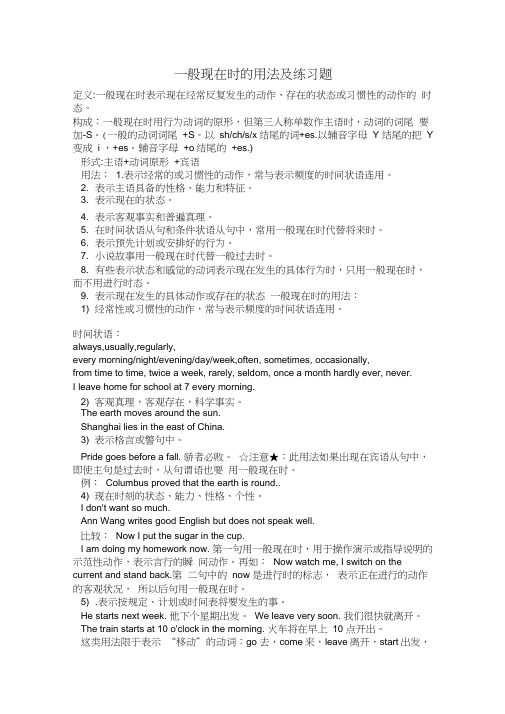
一般现在时的用法及练习题定义:一般现在时表示现在经常反复发生的动作、存在的状态或习惯性的动作的时态。
构成:一般现在时用行为动词的原形,但第三人称单数作主语时,动词的词尾要加-S。
(一般的动词词尾+S。
以sh/ch/s/x结尾的词+es.以辅音字母Y 结尾的把Y 变成i ,+es。
辅音字母+o结尾的+es.)形式:主语+动词原形+宾语用法: 1.表示经常的或习惯性的动作,常与表示频度的时间状语连用。
2. 表示主语具备的性格、能力和特征。
3. 表示现在的状态。
4. 表示客观事实和普遍真理。
5. 在时间状语从句和条件状语从句中,常用一般现在时代替将来时。
6. 表示预先计划或安排好的行为。
7. 小说故事用一般现在时代替一般过去时。
8. 有些表示状态和感觉的动词表示现在发生的具体行为时,只用一般现在时,而不用进行时态。
9. 表示现在发生的具体动作或存在的状态一般现在时的用法:1) 经常性或习惯性的动作,常与表示频度的时间状语连用。
时间状语:always,usually,regularly,every morning/night/evening/day/week,often, sometimes, occasionally,from time to time, twice a week, rarely, seldom, once a month hardly ever, never.I leave home for school at 7 every morning.2) 客观真理,客观存在,科学事实。
The earth moves around the sun.Shanghai lies in the east of China.3) 表示格言或警句中。
Pride goes before a fall. 骄者必败。
☆注意★:此用法如果出现在宾语从句中,即使主句是过去时,从句谓语也要用一般现在时。
例:Columbus proved that the earth is round..4) 现在时刻的状态、能力、性格、个性。
- 1、下载文档前请自行甄别文档内容的完整性,平台不提供额外的编辑、内容补充、找答案等附加服务。
- 2、"仅部分预览"的文档,不可在线预览部分如存在完整性等问题,可反馈申请退款(可完整预览的文档不适用该条件!)。
- 3、如文档侵犯您的权益,请联系客服反馈,我们会尽快为您处理(人工客服工作时间:9:00-18:30)。
人教版小学英语语法讲解及习题:一般现在时
一般现在时基本用法介绍
一般现在时的功能
1.表示事物或人物的特征、状态。
如:The sky is blue.天空是
蓝色的。
2.表示经常性或习惯性的动作。
如:I get up at six every day.我每天六点起床。
3.表示客观现实。
如:The earth goes around the sun.地球绕
着太阳转。
一般现在时的构成
1.be动词:主语+be(am,is,are)+其它。
如:I am a boy.我是一个男孩。
2.行为动词:主语+行为动词(+其它)。
如:We study English.我们学习英语。
【注意】当主语为第三人称单数(he, she,it)时,要在动词后加"-s"或"-es"。
如:Mary likes Chinese.玛丽喜欢汉语。
一般现在时的变化
1. be动词的变化。
否定句:主语+ be + not +其它。
如:He is not a worker.他不是工人。
一般疑问句:Be +主语+其它。
如:-Are you a student? -Yes.
I am. / No, I'm not.
特殊疑问句:疑问词+一般疑问句。
如:Where is my bike?
2.行为动词的变化。
否定句:主语+ don't( doesn't ) +动词原形(+其它)。
如:I don't like bread.
当主语为第三人称单数时,要用doesn't构成否定句。
如:He doesn't often play.
一般疑问句:Do( Does ) +主语+动词原形+其它。
如:- Do you often play football? - Yes, I do. / No, I don't.
当主语为第三人称单数时,要用does构成一般疑问句。
如:- Does she go to work by bike? - Yes, she does. / No, she doesn't.
特殊疑问句:疑问词+一般疑问句。
如:How does your father go to work?
3.动词+s的变化规则
1.一般情况下,直接加-s,如:cook-cooks, milk-milks
2.以s. x. sh. ch. o结尾,加-es,如:guess-guesses, wash-washes, watch-watches, go-goes
3.以“辅音字母+y”结尾,变y为i, 再加-es,如:study-studies
一般现在时用法专练:
一、写出下列动词的第三人称单数
drink ________ go ________ stay ________ make ________
look ________ have ________ pass ________ carry ________
come ________ watch ________ plant ________ fly ________
study________ brush ________ do ________ teach ________
二、用括号内动词的适当形式填空。
1. He often ________(have) dinner at home.
2. Daniel and Tommy _______(be) in Class One.
3. We _______(not watch) TV on Monday.
4. Nick _______(not go) to the zoo on Sunday.
5. ______ they ________(like) the World Cup?
6. What _______they often _______(do) on Saturdays?
7. _______ your parents _______(read) newspapers every day?
8. The girl _______(teach) us English on Sundays.
9. She and I ________(take) a walk together every evening.
10. There ________(be) some water in the bottle.
11. Mike _______(like) cooking.
12. They _______(have) the same hobby.
13. My aunt _______(look) after her baby carefully.
14. You always _______(do) your homework well.
15. I _______(be) ill. I’m staying in bed.
16. She _______(go) to school from Monday to Friday.
17. Liu Tao _______(do) not like PE.
18. The child often _______(watch) TV in the evening.。
